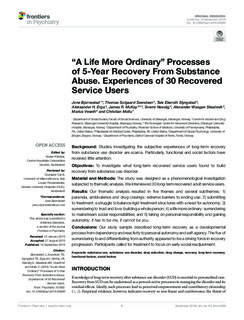| dc.contributor.author | Bjørnestad, Jone Ravndal | |
| dc.contributor.author | Svendsen, Thomas Solgård | |
| dc.contributor.author | Slyngstad, Tale Ekeroth | |
| dc.contributor.author | Erga, Aleksander Hagen | |
| dc.contributor.author | McKay, James R. | |
| dc.contributor.author | Nesvåg, Sverre Martin | |
| dc.contributor.author | Skaalevik, Alexander Waagan | |
| dc.contributor.author | Veseth, Marius | |
| dc.contributor.author | Moltu, Christian | |
| dc.date.accessioned | 2019-12-03T14:37:58Z | |
| dc.date.available | 2019-12-03T14:37:58Z | |
| dc.date.created | 2019-10-01T15:14:50Z | |
| dc.date.issued | 2019-09 | |
| dc.identifier.citation | Bjørnestad, J., Svendsen, T.S., Slyngstad, T.E. (2019) “A life more ordinary” Processes of 5-year recovery from substance abuse. Experiences of 30 recovered service users. Frontiers in Psychiatry, 10:689, 1-9. | nb_NO |
| dc.identifier.issn | 1664-0640 | |
| dc.identifier.uri | http://hdl.handle.net/11250/2631603 | |
| dc.description.abstract | Background: Studies investigating the subjective experiences of long-term recovery from substance use disorder are scarce. Particularly, functional and social factors have received little attention.
Objectives: To investigate what long-term recovered service users found to build recovery from substance use disorder.
Material and Methods: The study was designed as a phenomenological investigation subjected to thematic analysis. We interviewed 30 long-term recovered adult service users.
Results: Our thematic analysis resulted in five themes and several subthemes: 1) paranoia, ambivalence and drug cravings: extreme barriers to ending use; 2) submitting to treatment: a struggle to balance rigid treatment structures with a need for autonomy; 3) surrendering to trust and love: building a whole person; 4) a life more ordinary: surrendering to mainstream social responsibilities; and 5) taking on personal responsibility and gaining autonomy: it has to be me, it cannot be you.
Conclusions: Our study sample described long-term recovery as a developmental process from dependency and reactivity to personal autonomy and self-agency. The flux of surrendering to and differentiating from authority appeared to be a driving force in recovery progression. Participants called for treatment to focus on early social readjustment. | nb_NO |
| dc.language.iso | eng | nb_NO |
| dc.publisher | Frontiers Media S.A. | nb_NO |
| dc.rights | Navngivelse 4.0 Internasjonal | * |
| dc.rights.uri | http://creativecommons.org/licenses/by/4.0/deed.no | * |
| dc.subject | rusmisbruk | nb_NO |
| dc.subject | substance abuse | nb_NO |
| dc.subject | recovery | nb_NO |
| dc.title | “A life more ordinary” Processes of 5-year recovery from substance abuse. Experiences of 30 recovered service users | nb_NO |
| dc.type | Journal article | nb_NO |
| dc.type | Peer reviewed | nb_NO |
| dc.description.version | publishedVersion | nb_NO |
| dc.subject.nsi | VDP::Medical disciplines: 700::Clinical medical disciplines: 750::Psychiatry, child psychiatry: 757 | nb_NO |
| dc.source.pagenumber | 1-9 | nb_NO |
| dc.source.volume | 10 | nb_NO |
| dc.source.journal | Frontiers in Psychiatry | nb_NO |
| dc.source.issue | 689 | nb_NO |
| dc.identifier.doi | 10.3389/fpsyt.2019.00689 | |
| dc.identifier.cristin | 1732543 | |
| cristin.unitcode | 217,7,3,0 | |
| cristin.unitname | Institutt for sosialfag | |
| cristin.ispublished | true | |
| cristin.fulltext | original | |
| cristin.qualitycode | 1 | |

